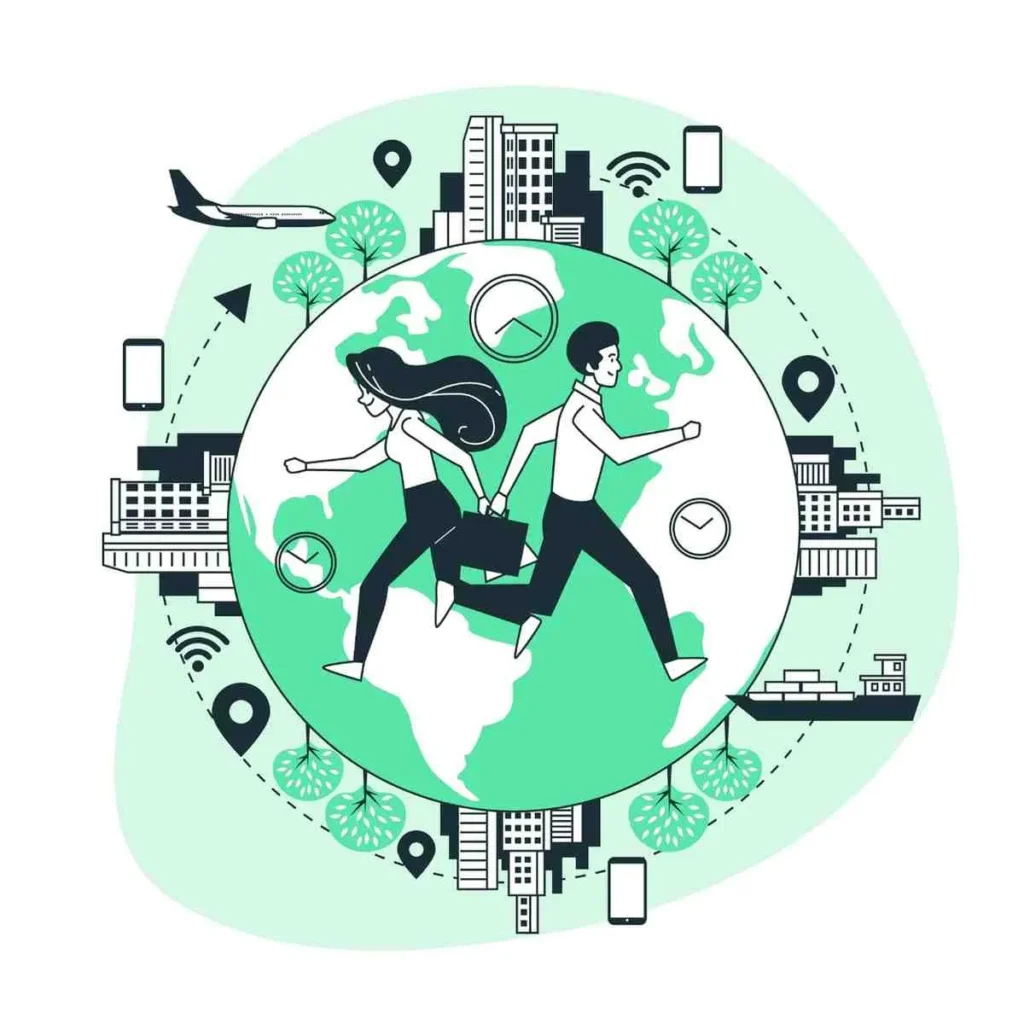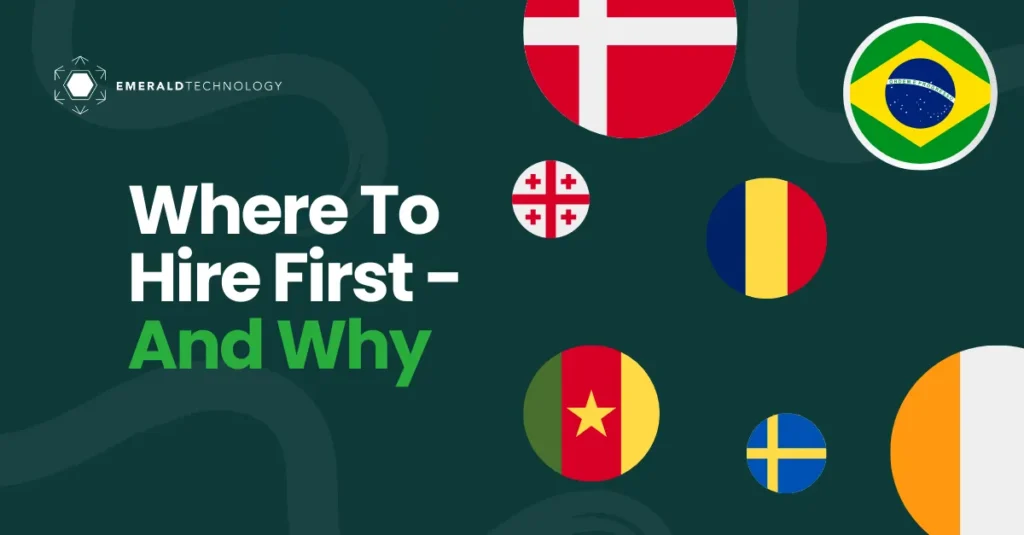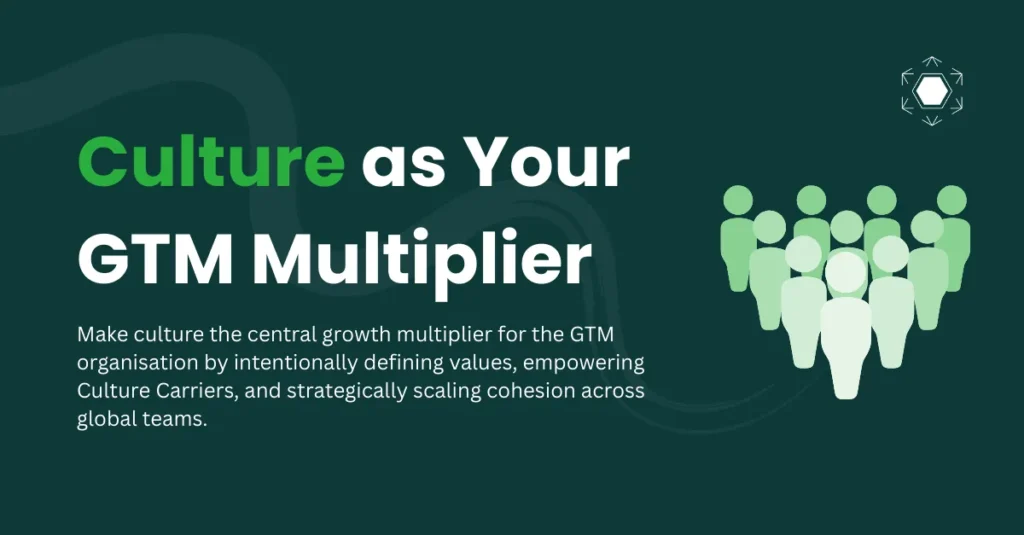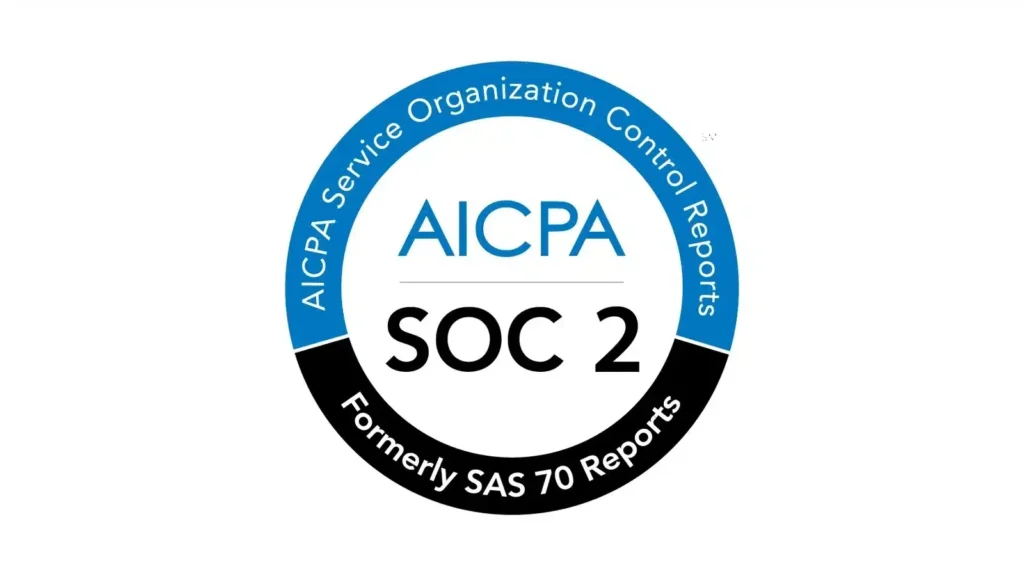The global workplace isn’t just changing, it’s accelerating. What once took decades now happens in months. For international employers, that pace brings both opportunity and pressure. AI is reshaping how work gets done. Remote teams are redrawing the map. Regulation is shifting faster than most companies can keep up. The result is a decentralised, high-stakes environment that’s more connected than ever, but far harder to control.
In this piece, we break down what’s really changing, what’s coming next, and how global employers can lead with confidence. The aim is simple: solve today’s challenges without setting up tomorrow’s.
AI and the New Global Workforce
It’s no secret that AI has sparked a productivity revolution across the global workplace. Sectors that have embraced AI are seeing labour productivity grow at five times the rate of those that haven’t. With results like that, it’s clear AI isn’t going anywhere. In fact, it’s becoming a permanent fixture in the future workplace.
Here’s what to expect as AI continues to reshape how we work:
- Creation of new roles and skillsets: The demand for AI literacy and technical know-how is rising fast. But AI doesn’t run independently; there’s still a human element needed to train, monitor and refine these systems. That’s why new job roles are emerging to support this shift. At the same time, ‘soft skills’ like communication and adaptability are becoming more valuable than ever, as AI takes over routine tasks and humans step further into strategic, creative and people-focused roles.
- A Push for Reskilling and Upskilling: As AI and automation accelerate workplace change, the pressure to adapt is only growing. Around half of all employees will need reskilling by 2025, but most organisations still aren’t moving fast enough to meet that need. Workers are expected to broaden their skill sets more often, learning how to use AI and work effectively alongside it.
- AI as a Co-Pilot, Not a Replacement: Yes, AI is expected to impact up to 300 million full-time jobs globally, but that doesn’t mean mass unemployment. Most of these roles won’t disappear entirely; they’ll evolve. AI’s not taking your job; it is taking your admin. That’s the shift. Who are the winners? Teams that know how to delegate to AI and double down on the human edge.
As AI tools become embedded in daily workflows, demand for AI literacy will only grow. The most successful professionals won’t be those who avoid AI, but those who learn how to use it strategically and work alongside it. In the new global workforce, knowing how to collaborate with machines will be just as critical as working with people. If you haven’t already, now is the time to audit your team’s AI readiness and identify where upskilling can create an edge. Emerald can support this process by helping you map skills, close gaps and stay competitive as AI continues to reshape how work gets done.
Digital Nomads: Mobility and Regulation in the Future Workplace
The rise of the digital nomad is redefining what it means to be part of the global workforce. These are high-skilled professionals who work remotely while living across borders, and their numbers are growing fast. Countries like Indonesia and Spain are actively competing for this talent through digital nomad visas and favourable tax incentives. In return, nomads drive real economic value by spending locally and increasing demand for high-quality, work-ready infrastructure. This is not a niche movement. It is a defining shift in the future of work.
Here are some key ways digital nomads are shaping the future of global work:
- Digital Nomads are a Growing but Contested Workforce: The freedom to work from anywhere makes this lifestyle highly appealing, especially to millennial and Gen Z professionals seeking flexibility, autonomy and global experience. But it’s also fuelling debate. Countries like the UK worry about a ‘brain drain’ as skilled talent moves abroad, while host nations benefit from economic gains, including new coworking spaces, housing demand and international spending. Still, gentrification and rising living costs have led to local pushback. As this workforce grows, employers face rising pressure to stay compliant across multiple jurisdictions. That’s where Emerald comes in, giving international teams the confidence to hire flexibly, stay ahead of regulatory shifts and build globally without the legal guesswork.
- Shifting Employer Attitudes Towards Remote Work: As concerns grow around the long-term impact of remote work on productivity and office culture, some companies are scaling back flexible work policies. Still, remote work remains attractive to much of the skilled global workforce, with many willing to accept lower salaries for flexibility or benefiting from ‘location arbitrage,’ earning strong currencies while living in lower-cost countries.
- Remote Work Infrastructure Is Evolving: The global demand for remote work infrastructure is rising fast, from reliable internet to coworking spaces and collaboration tools. As cities and countries compete to attract mobile talent, more destinations are investing in work-ready environments built for distributed teams. But as infrastructure improves, compliance challenges are becoming harder to ignore. Hiring across borders can quickly expose businesses to tax liabilities, misaligned benefits and legal risk if not managed properly. To stay protected, take tactical steps: review employment classification in each country, align compensation and benefits with local standards, and work with a global hiring partner like Emerald to manage compliance without setting up local entities.
- Legal and Compliance Complexities Are Growing: As digital nomadism blurs the lines between personal travel and professional residency, legal grey areas are becoming harder to ignore. Employers and governments are grappling with issues around tax residency, employment rights and social security contributions. Without the right systems in place, the risk of non-compliance can escalate quickly. Emerald’s global compliance infrastructure gives international teams the clarity and control they need to stay protected. We help you identify risks early, navigate local laws with confidence and avoid costly surprises. Quick tip: if someone’s working in a country for more than 30 days, you might already have a local tax exposure. Our team can help you assess the risk and take action before it becomes a problem.
Broader Shifts Shaping the Future Global Workplace
On top of what has been discussed, several other forces are set to reshape the global workplace.
- Ageing Workplace: Many developed economies are grappling with ageing populations, leading to labour shortages and growing pressure on succession planning. As older workers retire, businesses need clear strategies to retain institutional knowledge and attract younger talent across borders.
- Climate and Green Job Growth: The push towards sustainability is creating new industries and a wave of new jobs. This transition demands significant reskilling, especially in sectors like energy, transport and construction where green innovation is accelerating.
- Supply Chain Localisation: Geopolitical tensions and pandemic-era disruptions have driven a shift from global to regional supply chains. As companies localise production, new hiring hubs are emerging in previously overlooked areas, reshaping where and how global talent is sourced. Emerald helps teams adapt to these shifts with flexible hiring models that support speed, compliance and scalability.
The Human Factor: Wellbeing and Flexibility in the Future Global Workplace
The future of global work will be driven by technology and mobility, but it will be defined by how well we support people. Employee well-being is no longer just a perk. It is a business priority, especially in a global environment where burnout and disengagement are on the rise. Companies that invest in their people now will build stronger, more resilient teams for the long term.
- Mental Health Support Is Going Mainstream: Companies are experimenting with mental health stipends, flexible schedules and async tools to reduce pressure and give employees more control over their day. These aren’t just nice-to-haves anymore; they’re key to productivity and retention.
- Hybrid Work Is Here to Stay: The hybrid model is still evolving, blending the benefits of in-person connection with the autonomy of remote work. Expect more companies to focus on designing intentional, inclusive hybrid environments that support collaboration and individual well-being.
- Trust-Based Cultures Are Winning: Trust and flexibility are becoming major differentiators. The most attractive employers are those who empower people to work when and how they’re most effective, focusing on outcomes over hours. That shift is redefining company culture across borders.
Conclusion: Navigating the Future Global Workplace
The global workforce is being reshaped by AI, mobility, shifting regulations and growing expectations around well-being. For employers, this brings both opportunity and complexity. Staying ahead means being proactive, adapting to new ways of working, meeting compliance challenges, and supporting people wherever they are.
Emerald helps international employers cut through the noise. Whether hiring across borders or adapting to remote-first realities, our team simplifies global employment so you can focus on growth.Ready to future-proof your workforce? Talk to a specialist today and discover how Emerald can help you build a compliant, agile, resilient global team.




